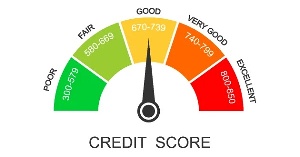Business News of Wednesday, 28 May 2025
Source: www.ghanawebbers.com
Financial and economic impact of individual consumer credit scoring in the Ghanaian economy: A comprehensive analysis
Introduction
Ghana's financial landscape is changing due to credit scoring initiatives like myCreditScore. Mobile money usage has surpassed 22 million users. The country is moving towards data-driven lending. This shift from collateral-based to behavior-based assessments impacts lending and economic stability.
Theoretical Framework
*Economic Theory of Information Asymmetry*
Research by Akerlof, Spence, and Stiglitz explains information asymmetry in lending. Their work shows that structured credit assessments reduce risks in lending markets.
*Financial Inclusion Theory*
The World Bank states that credit scoring systems boost economic participation. This is especially true in developing economies with low banking penetration but high digital engagement.
Impact Analysis: Ghana
*Quantitative Market Transformation*
Recent data from myCreditScore shows significant market impact. The program has enabled 40,791 credit disbursements worth GHS 637,799.82. It boasts a low default rate of 2.51% and a non-performing loan rate of 3.44%. These figures indicate improved risk assessment capabilities.
*Economic Multiplier Effects*
Research from the University of Ghana Business School highlights benefits from better credit access:
- Increased business formation due to accessible credit.
- Enhanced growth for small and medium enterprises (SMEs).
- Higher employment rates as businesses expand.
- Reduced reliance on informal lending in urban areas.
Comparative Analysis with Other Markets
*Kenya's Mobile Credit Revolution*
Kenya's M-Shwari has transformed microfinance access significantly. Micro-loan access increased by 70% since its launch, while processing costs halved.
*India's MSME Transformation*
India’s comprehensive credit scoring has boosted its MSME sector. Lending to these enterprises rose by 35%, with default rates dropping by 45%.
*Brazil's Inclusive Growth Story*
Brazil’s credit scoring system has improved financial inclusion greatly. Access for lower-income segments increased by 40%, while interest rates fell by 25%.
Economic Impact Categories
*Financial Sector Efficiency*
Credit scoring leads to lower transaction costs and precise risk assessment. It optimizes capital allocation through data-driven lending.
*Business Growth Impact*
Higher SME lending volumes result from increased transparency in credit access. This improves business survival rates and competition.
*Consumer Welfare Enhancement*
Individuals with good credit histories face lower borrowing costs. Access to credit expands across demographic segments, stabilizing consumption patterns.
Macroeconomic Effects
*GDP Growth and Economic Activity*
The African Development Bank estimates that comprehensive scoring could add up to 2% annual GDP growth in Ghana.
*Financial System Stability*
The Bank of Ghana reports that institutions using scoring have about 40% lower non-performing loan rates, enhancing resilience.
Policy Implementation Framework
*Regulatory Architecture*
The Bank of Ghana has created a strong regulatory framework for credit reporting:
- Credit Reporting Act (2007): Legal basis for sharing information.
- Data Protection Act (2012): Ensures consumer privacy.
Ongoing updates address emerging technologies.
*Technological Infrastructure Development*
Ghana’s digital infrastructure supports these systems effectively:
- GhIPSS aids payment data collection.
- Mobile operators provide alternative data sources.
- The Ghana Card helps verify identities.
International Best Practices and Adaptation
*U.S. FICO Model*
The U.S.'s FICO system shows long-term benefits of standardized scoring:
- Annual GDP contribution estimated at 2.5%.
- Consumer lending volume increased by $1.9 trillion over two decades.
Lending decisions are made much faster now.
*Singapore’s Digital Credit Infrastructure*
Singapore demonstrates how technology enhances effectiveness:
- Real-time decision-making capabilities.
- Cross-border score portability.
Automated fraud detection systems are also integrated.
Future Projections for Ghana
*Economic Growth Potential*
World Bank and IMF projections suggest substantial growth through improved scoring:
- Formal market expansion of 30–35% annually.
- Average lending cost reduction of 25–30%.
SME sector growth could accelerate by up to 20%.
*Market Development Opportunities*
There are opportunities for integrating alternative data sources like utility bills or mobile transactions into AI-driven models.
Implementation Challenges and Solutions
Data quality issues arise from limited historical records and informal transactions. Solutions include incentivizing digital transactions and standardizing reporting practices.
Technical infrastructure needs real-time processing improvements and cybersecurity enhancements for better interoperability among systems.
Conclusion
Ghana's transformation through modern credit scoring represents a vital case study in financial development. Evidence suggests significant economic benefits can be achieved through continued investment in this infrastructure.
A balanced approach—leveraging technology, regulations, and innovation—will ensure long-term success while protecting consumers' interests.
Ghana can serve as a model for other developing economies aiming to enhance their financial infrastructures and promote inclusive growth.











